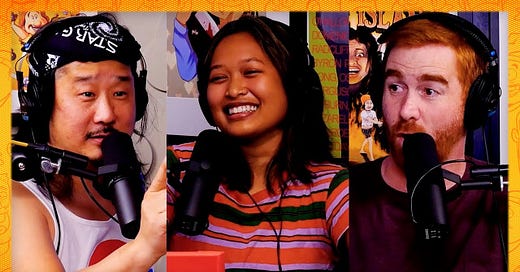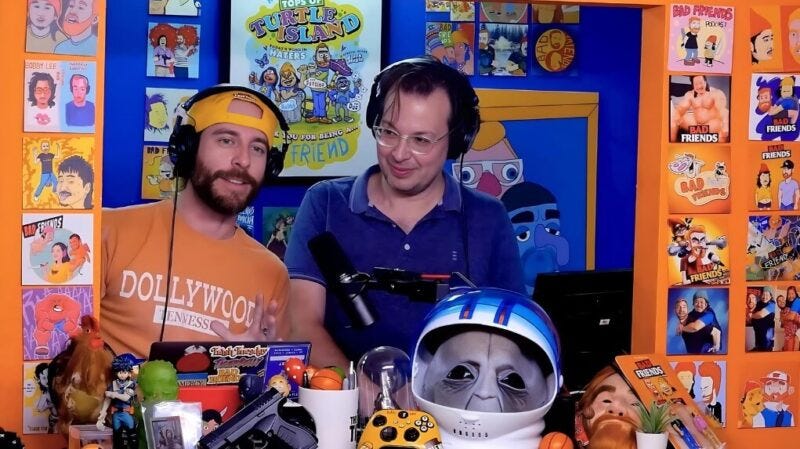Men in their 30s with Few to No Friends, ‘Bad Friends’ is for You
Comedians Bobby Lee and Andrew Santino revive what makes friendship fun, sweet, and essential
This won’t come as a surprise: Men over 30 barely have any friends. You can pick and choose from the various scientific researches as to why, the numerous personal essays written on the subject, or mine your own experience and list the names of people you fell out with or lost to career, marriage, and kids over the years. As Jessica Stillman writes in her Inc. piece, “If you get the sense that it’s way harder to make friends as an adult than it was when you were younger, you’re onto something. The difficulty isn’t that you’re uncool or awkward. It’s that the essential building blocks of friendship are harder to come by when you’re older.”
If you’re also an introverted immigrant like me, you know there’s a whole other level to this epidemic. Look, I’m not here to tell you what to do or how to change that (I just moved to a country where I don’t know a single soul) but to talk about a podcast that brought me more laughs and joy within a year than any night outs with old/new friends in the past five.
Since 2020, Bad Friends has shot up and become one of the most popular comedy podcasts, and its success comes down to this: whenever you watch it, you feel included. As a viewer, you’re a fly on the tiny and colorful studio’s wall, and the hosts, Bobby Lee and Andrew Santino, not only acknowledge your presence but welcome you with open arms. Granted, it’s taken me about half a dozen episodes to get into the show’s unsteady rhythm and full-on chaos (it often feels like a circus thanks to Andrew’s excellent mouth-trumpet skills), but once I did, I was instantly addicted and obsessed with it. Bad Friends resurrected something that I’ve been mourning for nearly two decades — the loss of my closest childhood buddies and the unfiltered fun we used to have as kids and teenagers. That sense of belonging to a group of oddballs and confidants you can not only count on but laugh yourself to tears with.
When I was in my teens, I remember hanging out in cheap and low-key small-town bars in my Hungarian hometown, surrounded by people I knew from school or being a friend of a friend. It didn’t need to be a party or a special occasion, just a perfectly mundane day with friends I usually had a blast with. A mix of weirdos, cool guys, and forever-known blokes from around the neighborhood who provided an unspoken comfort and freedom to be my unapologetic self. Seeing those guys daily created a regularity where we were so tuned in with each other that we immediately clocked inside jokes on a single look or throwaway line to know who or what to laugh at. To this day, I’d give one of my kidneys to relive those times.
At its best, Bad Friends comes close to replicating that feeling. It’s like hanging out in a vibrant dorm room every week, watching friends tease and mock each other to death, sharing hilarious (and often wildly inappropriate) anecdotes in seamless banter. There’s never a dull moment due to the podcast’s loose structure and improvisational nature, always aiming to surprise you with something unpredictable. Regular guests constantly come and go — like Rudy Jules, Bobby's Filipino "niece," if you will, who he actually lives with and loves like a daughter although they aren't related. Or the sweet Jessie Johnson, the conspiracy-lover Doc Willis, the awkward Youtuber Dax Flame, and a bunch of other legit comedians Andrew and Bobby invite all the time (Sebastian Maniscalco appeared as a guest once, and so did Bill Burr).
But I'd argue that the best aspect of the show — besides the sincere chemistry — is how much it involves the producers, writers, and other team members behind the podcast in all the shenanigans. There’s hardly another web series doing that to such an extent, building running gags with virtually everyone on the show that leads to genuinely hysterical bits. I mean, Carlos’s eerie “glory hole experiences” and weird dating stories could fill a whole (very disturbing) book by themselves. Or there’s Andreas’ zombie movie that likely won't ever be made — certainly not with Bobby — despite all the talk around it. I could go on and on citing bits with other members like George, Pete, and McKone, but my point is that Bad Friends not only feels like a family but truly is one.
A testament to that, coincidentally, comes in the latest episode in which Andrew is asked by their guest (Morgan Jay) whether they achieved everything they wanted to with the podcast. He explains, “We've always said, as soon as we could employ and have fun with our friends, we beat the system. Everybody in here is a friend of ours from many years ago. Our goal was, if you could work with your friends and make shit, that was like, can we do that all the time?”
As a single guy in his 30s with few close friends left, that kinda sounds like a dream to me. To have a job and a place designated to hang out and have fun with people you love the most and even get paid for it. I mean, I’m sure it’s not all rainbows and sunshine (no friendship or work relationship is), but as I age and see people drift away because of marriage, kids, moving, and other life circumstances, I feel bummed out about how strong and seemingly unbreakable male friendships fall apart and lose their value.
Thus Bad Friends is like an oasis in a social desert to men who feel lost, abandoned, or left behind through no fault of their own. Don't get me wrong, a show like this can never replace the real thing, but if you're in desperate need of cheering up and wanting to connect, you can't go wrong with it. In fact, for more than an hour, it’ll make you forget all your problems and soothe your anxieties.
After all, isn’t that what friends are for?
If you enjoyed this essay, please consider liking and sharing it so it can reach a wider audience. As always, thanks for reading.






